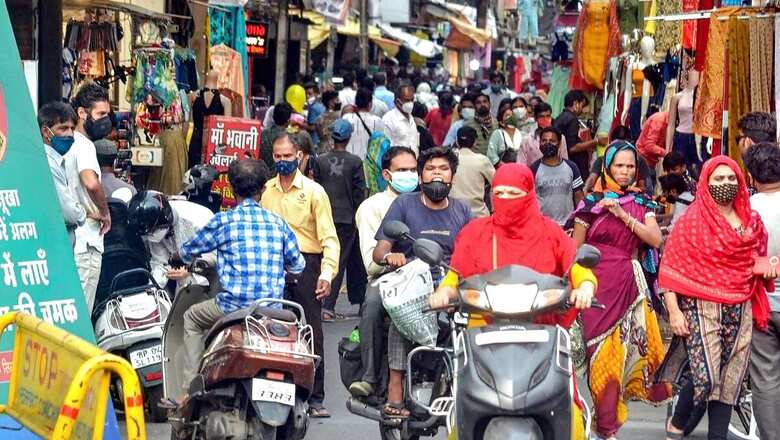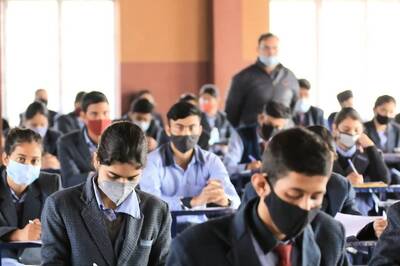
views
“The hope expressed in Article 44 of the Constitution that the State shall secure for its citizens Uniform Civil Code ought not to remain a mere hope.” This is an excerpt from a recent Delhi High Court judgment, wherein the judiciary has once again conveyed the need of having a Uniform Civil Code (UCC) in our country. Consequently, the debate and deliberations on the need for the uniform governance of personal laws has been brought back to the table.
Before moving ahead let us understand what personal laws are. The people of India belong to different religions and faiths. They are governed by different sets of laws in respect to matters relating to family affairs, i.e., marriage, divorce, adoption and succession. We inherited this system of having different sets of personal laws for different communities from the British colonial rule, as our lawmakers at the time of Independence preferred not to interfere with religious issues. But by providing a provision for UCC in our Constitution, the constituent assembly clearly manifested its vision about uniform India.
The Directive Principles of State Policies (DPSP) in the Indian Constitution under Article 44 states that “The State shall endeavour to secure for citizens a uniform civil code throughout the territory of India.” Pursuant to this provision, the task of enforcing a UCC in the country was dropped in the bucket of the legislature by the Constitution makers. Being a DPSP, Article 44 is not enforceable in courts alike the fundamental rights.
Rather it awaits the action of the Parliament to make a law for establishing a common civil code for all. The aim of the Constitution makers was to gradually and consensually move towards a common civil code for all citizens in future.
However, the political unwillingness and incapacity to call spade a spade has lingered on this issue for very long. The Supreme Court and various High Courts in catena of matters have counseled the governments to enforce a UCC for more than four decades. The Shah Bano case (1985) dealing with maintenance to divorced Muslim women, thereafter the Jordan Diengdeh case (1985) examining the Christian Succession Act, the Sarla Mudgal case (1995) against deceitful Islamic conversion for polygamy, and the John Vallamattom case (2013) on succession rights to the recent Delhi High Court judgment, are amongst the multiple instances when the courts have strongly urged the need of having uniform civil code for the country.
ALSO READ | Delhi HC Backs Uniform Civil Code, Asks Centre to Take Necessary Steps for its Implementation
In 2016, the Law Commission of India also issued a questionnaire, inviting public opinion on the need for UCC and codification of personal laws in India. The 17 questions in the survey touched upon various personal laws provisions perceived as discriminatory and unjust. Let us look at some of these significant issues from the questionnaire.
● Contemplating the age of marriage, question no. 10 puts forth whether there should be a uniform age for consent of marriage. We know that the age for valid marriage for girls is 18 years and boys is 21 years, but this is not uniform across the citizenry. Under Muslim law, marriages of children under 16 years of age is allowed with permission of Sharia authorities.
● Question no. 11 touches upon the grounds of divorce to be uniform across all religions, as opposed to the current scenario. As per the questionnaire, one option could be having the same grounds for divorce, but within the respective personal laws only. Another option is having different grounds as per cultural differences.
● Another issue was raised regarding the unreasonable separation period in the Christian Divorce Act. For mutual divorce among Christians, a two-year waiting period is compulsory before the divorce which is unjust and harassing. This two year period is a very long time for a person to survive alone. Though the Supreme Court for a particular case reduced this period to one year in some circumstances but by the legislation this separation period is still two years.
● Question no. 4 seeks opinion on whether codification of personal laws will ensure gender equality? The answer is yes, because a codified law in the form of UCC will be enacted by the legislature. Therefore, it will be under the purview of judicial review and cannot be arbitrary or discriminatory against anyone under Articles 14 and 15.
It will also enable the legislature to reform them as per needs of time. For example, since the Hindu Succession Act is codified, the Parliament by an amendment in 2005 granted the equal coparcenary rights to daughters as that of a son in father’s property.
● Furthermore, it has been asked if UCC should be optional or mandatorily applicable on all. Drawing lessons from past experiences, UCC should be applicable to all the citizens without choice. If given the option, very few people have the tendency to be voluntarily governed by such laws. For example, maintenance rights under Code of Criminal Procedure (CrPC) is optional for
Muslim couples under the Muslim Women (Protection of Rights on Divorce) Act, 1986. However, very few couples by affidavit register themselves to be governed by Section 125 of CrPC.
Are All Communities Liberal Enough to Reform by Themselves?
A set of people argue that reforms with reference to ‘personal law’ must come from within the community and should not be imposed by the legislature. Observing the past and prevailing attitude of the community leaderships, this is very unlikely to happen. The influential stakeholders enjoying the inadequate societal setup actually want to drag the subjects on the backward track. The outrage by stakeholders in the aftermath of the Shah Bano (1985) and Triple talaq verdict proves this.
One will be shocked to know the views of leaders of communities. For example, the affidavit by the All India Muslim Personal Law Board submitted before the Supreme Court in the Re: Muslim Women Quest For Equality, commonly known as the Triple Talaq case, was shocking. The Muslim Personal Law Board vehemently defended the practices of triple talaq, polygamy and nikah halala on affidavit. Some of the excerpts from the affidavit are reproduced below which need no explanation. In affidavit the board stated that:
(i) “If there develops serious discord between the couple, and the husband does not at all want to live with her, legal compulsions of time-consuming separation proceedings and expenses may deter him from taking the legal course. In such instances, he may resort to illegal, criminal ways of murdering or burning her alive,”
(ii) “Granting a husband the right to divorce indirectly provides security to the wife. Marriage is a contract in which both parties are not physically equal. Male is stronger and female weaker sex.”
(iii) “Polygamy is a social need and a blessing for women because an unlawful mistress is more harmful for social fabric than a lawful second wife.”
(iv) “Polygamy ensures sexual purity and chastity and whenever polygamy has been banned, it emerges from history that illicit sex has raised its head.”
The relevance and moral aspects of this practice need not be discussed. Contrary to the above, the purpose of sharia law has been beautifully explained by the Islamic scholar Asaf A.A. Fyzee in his book ‘Outlines of Muhammadan Law’ as “What is morally beautiful that must be done; and what is morally ugly must not be done. That is law or Shariat and nothing else can be law.”
Today, these religious boards no longer command the same respect as it was at the time of inception. All India Muslim Personal Law Board claims its laws to be as per Quran. However, on numerous occasions Muslim scholars like Maulana Maudidi have proved that many provisions by Muslim personal law board are not as per the text given in Quran.
UCC and Minorities
A very common myth perpetrated to intimidate the minorities is that the UCC will entirely take away their customary laws and axe their culture. Legally, UCC will be a common civil code for all citizens that will have codified personal laws for all religions. It can be assumed that the UCC in India will have different parts for each religion to sanction customary practices in matters of marriage, divorce, maintenance or succession. For example, the Hindu Marriage Act, 1955 sanctions practices like Saptpadi or kanyadaan in reference to valid marriages, along with recognising the regional customary practices. It being an enacted legislature, the possibility of the provisions infringing fundamental rights is ruled out.
ALSO READ | EXPLAINED: Why Uniform Civil Code Is Not A Reality Yet. What It Will Mean For India To Have One
Also, the above stated matters will be shifted in the domain of the legislature from the clutches of religious boards. This will enable the legislature to assess and modify the laws in order to meet the requirements of changing times and also empower the Court to exercise its review jurisdiction effectively.
The Goa Civil Code
Reference can be drawn to the Goa Civil Code, 1961, which is very similar to the UCC with a few exceptions. Not all people know that Goa has a common civil code for all citizens in the state. The Portuguese Civil Code existed there till Goa got independence in 1961, which later became the Goa Civil Code. In 1981, then Prime Minister Indira Gandhi appointed a commission to impose non-uniform personal laws in Goa, identical to the rest of India. However, this move was strongly opposed by the Muslim Women Association and Youth Welfare Associations in the state. As a consequence, Goa continues to have the same civil code.
UCC is above Hindu-Muslim or majority-minority issues. The recent judgment of the Delhi High Court pertinently brings out the same. In that case, the dispute was between a couple belonging to the Meena tribe, which is notified to be exempted from the provisions of Hindu Marriage Act. Examining the applicability of the Hindu Marriage Act on the members of the community who were married as per Hindu customs, the court observed that “Codified statutes and laws provide for various protections to parties against any unregulated practices from being adopted.”
Uniform Civil Code is a systemic solution against discrimination by enforcing reforms within the Hindu, Muslim, Christian and Parsi communities. Rather we can say that it’s a secular step. History tells us that when the Hindu Marriage Act, 1955, Hindu Adoption and Maintenance Act, 1956 and Hindu Succession Act, 1956 were passed after Independence, the Nehru government faced stiff resistance against passage of such laws. We can now observe the long-term benefits of the firm decisions taken at that time. There is no doubt that the codified Hindu laws have played a substantial reformative role in uplifting the status of women in Indian society.
The existence of systemic discrimination and inequality under the shadow of personal laws has already deprived a section of our citizens for a long time. The discriminatory practices cannot be defended citing religious faith or essential practices. If so, then child marriage or sati pratha would never have been ended.
The recent GST reforms, triple talaq law, or abrogation of Article 370 have proven that India is more confident than ever before to accommodate and progress with essential structural reforms.
An all-embracing UCC will not be confined to the codification of uncodified laws solely. It will also lead to the eradication of unreasonable discriminatory provisions regarding adoption, succession, inheritance, guardianship, marriage, divorce and maintenance in Hindu, Muslim, Christian and Parsi laws. Although India has historically and culturally imbibed the feature of tolerating and accommodating diversity, but a diversity that leads to discrimination of women is of no glory.
“यत्र नार्यस्तु पूज्यन्ते रमन्ते तत्र देवता”: – Where women are honored, god resides there.
Tejasvi Surya is Member, Lok Sabha and President, Bhartiya Janta Yuva Morcha and Suyash Pande is a practicing advocate in the Supreme Court and law graduate of National Law University, Raipur. The views expressed in this article are those of the author and do not represent the stand of this publication.
Read all the Latest News, Breaking News and Coronavirus News here.
















Comments
0 comment